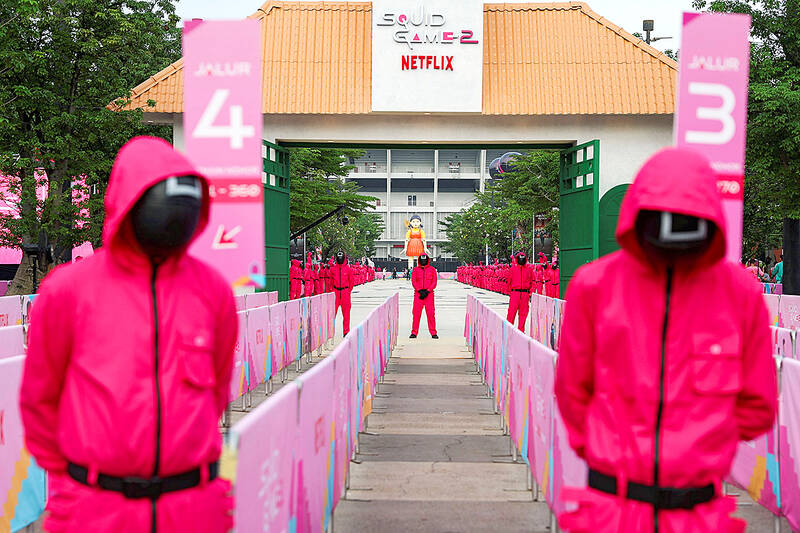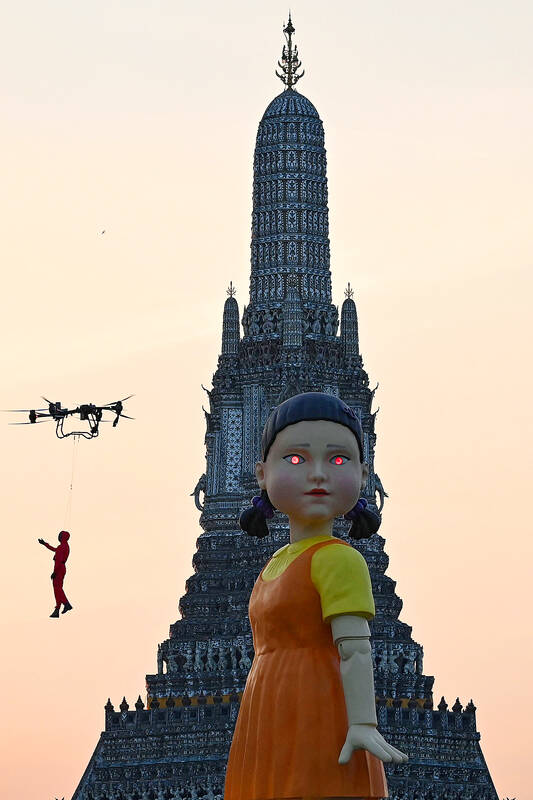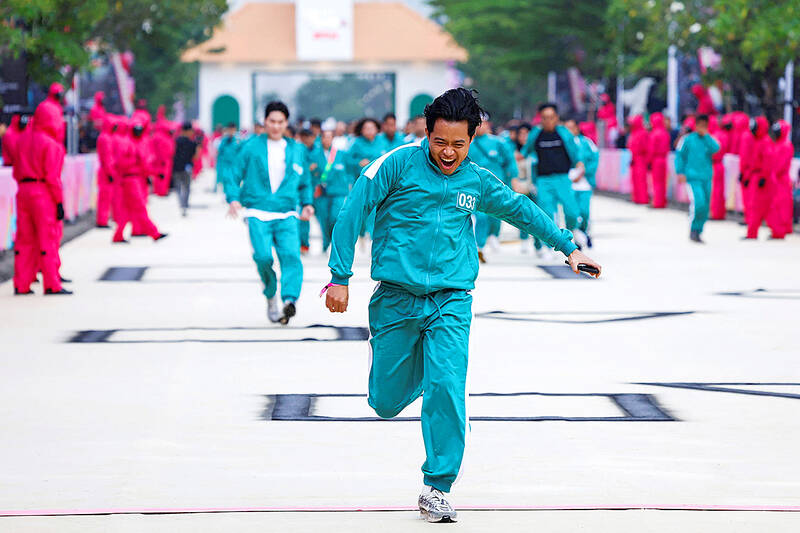A factory turned into a battlefield, riot police armed with tasers and an activist who spent 100 days atop a chimney — the unrest that inspired Netflix’s most successful show ever has all the hallmarks of a TV drama.
This month sees the release of the second season of Squid Game, a dystopian vision of South Korea where desperate people compete in deadly versions of traditional children’s games for a massive cash prize.
But while the show itself is a work of fiction, Hwang Dong-hyuk, its director and writer, has said the experiences of the main character Gi-hun, a laid-off worker, were inspired by the violent Ssangyong strikes in 2009.

Photo: Reuters
“I wanted to show that any ordinary middle-class person in the world we live in today can fall to the bottom of the economic ladder overnight,” he has said.
In May 2009, Ssangyong, a struggling car giant taken over by a consortium of banks and private investors, announced it was laying off more than 2,600 people, or nearly 40 percent of its workforce.
That was the beginning of an occupation of the factory and a 77-day strike that ended in clashes between strikers armed with slingshots and steel pipes and riot police wielding rubber bullets and tasers.

Photo: AFP
Many union members were severely beaten and some were jailed.
‘MANY LOST THEIR LIVES’
The conflict did not end there.

Photo: Reuters
Five years later, union leader Lee Chang-kun held a sit-in for 100 days on top of one of the factory’s chimneys to protest a sentence in favor of Ssangyong against the strikers.
He was supplied with food from a basket attached to a rope by supporters and endured hallucinations of a tent rope transformed into a writhing snake.
Some who experienced the unrest struggled to discuss Squid Game because of the trauma they endured, Lee said.
The repercussions of the strike, compounded by protracted legal battles, caused significant financial and mental strain for workers and their families, resulting in around 30 deaths by suicide and stress-related issues, Lee said.
“Many have lost their lives. People had to suffer for too long,” he said.
He vividly remembers the police helicopters circling overhead, creating intense winds that ripped away workers’ raincoats.
Lee said he felt he could not give up.
“We were seen as incompetent breadwinners and outdated labor activists who had lost their minds,” he said.
“Police kept beating us even after we fell unconscious — this happened at our workplace, and it was broadcast for so many to see.”
Lee said he had been moved by scenes in the first season of Squid Game where Gi-hun struggles not to betray his fellow competitors.
But he wished the show had spurred real-life change for workers in a country marked by economic inequality, tense industrial relations and deeply polarized politics.
“Despite being widely discussed and consumed, it is disappointing that we have not channeled these conversations into more beneficial outcomes,” he said.
‘SHADOW OF STATE VIOLENCE’
The success of Squid Game in 2021 left him feeling “empty and frustrated.”
“At the time, it felt like the story of the Ssangyong workers had been reduced to a commodity in the series,” Lee said.
Squid Game, the streaming platform’s most-watched series of all time, is seen as embodying the country’s rise to a global cultural powerhouse, part of the “Korean wave” alongside the Oscar-winning Parasite and K-pop stars such as BTS.
But its second season comes as the Asian democracy finds itself embroiled in some of its worst political turmoil in decades, triggered by conservative President Yoon Suk-yeol’s failed bid to impose martial law this month.
Yoon has since been impeached and suspended from duties pending a ruling by the Constitutional Court.
That declaration of martial law risked sending the Korean wave “into the abyss”, around 3,000 people in the film industry, including Parasite director Bong Joon-ho, said in a letter following Yoon’s shocking decision.
Vladimir Tikhonov, a Korean studies professor at the University of Oslo, said that some of South Korea’s most successful cultural products highlight state and capitalist violence.
“It is a noteworthy and interesting phenomenon — we still live in the shadow of state violence, and this state violence is a recurrent theme in highly successful cultural products.”

Taiwan doesn’t have a lot of railways, but its network has plenty of history. The government-owned entity that last year became the Taiwan Railway Corp (TRC) has been operating trains since 1891. During the 1895-1945 period of Japanese rule, the colonial government made huge investments in rail infrastructure. The northern port city of Keelung was connected to Kaohsiung in the south. New lines appeared in Pingtung, Yilan and the Hualien-Taitung region. Railway enthusiasts exploring Taiwan will find plenty to amuse themselves. Taipei will soon gain its second rail-themed museum. Elsewhere there’s a number of endearing branch lines and rolling-stock collections, some

The Democratic Progressive Party (DPP), Chinese Nationalist Party (KMT), and the country’s other political groups dare not offend religious groups, says Chen Lih-ming (陳立民), founder of the Taiwan Anti-Religion Alliance (台灣反宗教者聯盟). “It’s the same in other democracies, of course, but because political struggles in Taiwan are extraordinarily fierce, you’ll see candidates visiting several temples each day ahead of elections. That adds impetus to religion here,” says the retired college lecturer. In Japan’s most recent election, the Liberal Democratic Party lost many votes because of its ties to the Unification Church (“the Moonies”). Chen contrasts the progress made by anti-religion movements in

Could Taiwan’s democracy be at risk? There is a lot of apocalyptic commentary right now suggesting that this is the case, but it is always a conspiracy by the other guys — our side is firmly on the side of protecting democracy and always has been, unlike them! The situation is nowhere near that bleak — yet. The concern is that the power struggle between the opposition Chinese Nationalist Party (KMT) and their now effectively pan-blue allies the Taiwan People’s Party (TPP) and the ruling Democratic Progressive Party (DPP) intensifies to the point where democratic functions start to break down. Both

This was not supposed to be an election year. The local media is billing it as the “2025 great recall era” (2025大罷免時代) or the “2025 great recall wave” (2025大罷免潮), with many now just shortening it to “great recall.” As of this writing the number of campaigns that have submitted the requisite one percent of eligible voters signatures in legislative districts is 51 — 35 targeting Chinese Nationalist Party (KMT) caucus lawmakers and 16 targeting Democratic Progressive Party (DPP) lawmakers. The pan-green side has more as they started earlier. Many recall campaigns are billing themselves as “Winter Bluebirds” after the “Bluebird Action”